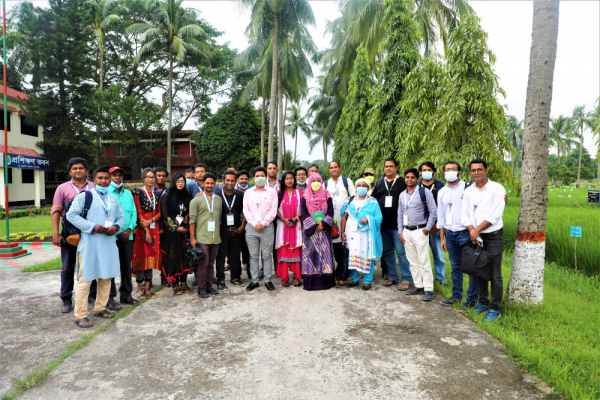
In a bid to effectively disseminate information on agricultural innovation and build the capacity of media personnel to do pro-active and pre-emptive agriculture reporting in attaining SDGs and achieving food security, Farming Future Bangladesh (FFB) hosted a daylong training and knowledge sharing event on September 26, 2020, for journalists at greater Rajshahi region in Rajshahi.
The program, “titled “Knowledge Sharing & Capacity building on Agricultural Media Reporting.” focused on the skills of effectively communicating scientific and technological innovations like agri-biotechnology and biosafety, which is characterized by both conceptual complexity and multi-disciplinarily, a multi-pronged approach.
On an average 25 journalists attended the program, representing diverse fields of communication such as newspapers, television, magazine journalists, bloggers etc. Keeping the multi-faceted nature of Agri-biotechnology in view, the training schedule was intended to provide a more extensive overview of a diverse spectrum of topics related to Agri-biotechnology and agricultural innovation and its communication. As a result of this some broad range of topics related to Genetically Modified crops, food safety issues, agri-biotech innovations, science communication practices etc., were discussed and deliberated upon by renowned journalists, academicians, scientists and sectoral specialists from leading media outlets, research institutes and Rajshahi University.
The training event provided an opportunity for media practitioners to interact with renowned journalists, scientists to talk about the issues, prospects, challenges, and innovations in agriculture and biotechnology. Which in turn is expected to generate awareness among the masses.
“Social acceptance is crucial when it comes to successfully implementing the applications of agri-biotechnology. And social acceptance depends on sharing accurate information about how the technology is developed and implemented, as well as details on how farmers and consumers can benefit.,” said Md. Arif Hossain, CEO & executive director of FFB.
Bangladesh has already adopted one biotech crop, the pest resistant Bt brinjal. Farmers who grow the improved brinjal seeds have greatly reduced their use of pesticides and increased their incomes six-fold. They also improved their yields.
Farmers and consumers can enjoy similar benefits with the adoption of other crops currently under development by Bangladeshi scientists, including a blight-resistant potato and vitamin A-enriched Golden Rice, Hossain said.
Mr. Shatil Siraj, Associate Professor, Department of Mass Communication and Journalism, University of Rajshahi, in his keynote presentation said that the role of mass media in disseminating information about science is immense. He emphasized the need to organize more such training and knowledge sharing programs in other districts of Bangladesh as well.
“We are looking forward to seeing Bangladesh and other nations expand their use of agricultural innovations to end hunger and improve the lives of their people,” Hossain said.
FFB is a comprehensive communications and community empowerment initiative to help improve awareness about modern agricultural innovations, including crop biotechnology, in Bangladesh. Based in Dhaka, the initiative operates under the auspices of the Cornell Alliance for Science, based at Cornell University, with support from the Bill & Melinda Gates Foundation.


